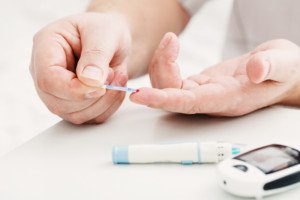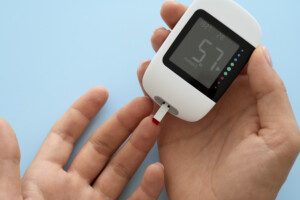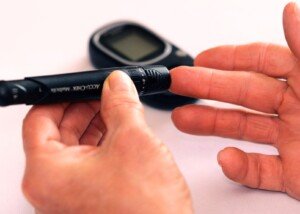November is Diabetes Awareness Month.
Every November, National Diabetes Awareness Month is recognized by organizations, charities and individuals in order to increase visibility of the disease and to raise funds for research into its cause, prevention, diagnosis and treatment.
While awareness certainly shines a spotlight on the disease, this moment should also be a time for the healthcare industry to reflect on how we are doing with improving outcomes for patients with diabetes.
Over the last few years, wearable monitoring devices, home medical testing equipment and mobile apps have begun to fundamentally change how individuals manage their health.
The ability to collect personal health data – such as blood pressure, heart rate or blood sugar levels – and to track those trends over time while adjusting personal behavior – should, in theory, empower patients to better manage their health conditions and potentially achieve better outcomes.
But for individuals with diabetes, the move to self-management has often had the opposite effect, resulting in low self-esteem, anxiety and depression.
Consequently, many people do not monitor blood sugar as regularly as they should.
This overwhelming negative response by patients has typically resulted in silence from the medical community.
Now is the time – especially during Diabetes Awareness Month – for the healthcare community to begin to embrace these modern tools and to leverage them in their practices to support people with diabetes so they can achieve greater personal balance and success in improving their health.
The Current State of Diabetes Care
About 12% of the U.S. population has diabetes — and that number continues to grow.
By 2030, more than 39.7 million, or 13.9% of individuals in the country, will be diagnosed with diabetes.

Shutterstock/Maya Kruchankova
As an answer to the growing prevalence of this disease, new, less invasive blood glucose monitoring tools have been introduced to the market.
These consumer-friendly technologies enable the healthcare community to put more of the day-to-day management responsibility in the hands of the patients themselves.
In fact, for years self-monitoring of blood glucose has been presented positively by healthcare professionals and marketed by manufacturers as an easy way to control diabetes and enable patients to live a “normal” life.
While the potential for improving an individual’s understanding of lifestyle and medication impact on blood glucose levels is there, the reality for patients can be quite different.
One study noted that the positive representations of self-monitoring don’t address the “visible and invisible work that patients with diabetes have to do, nor do they acknowledge the unexpected and sometimes negative readings with which the patients are sometimes confronted despite their efforts.”
Even though patients are empowered with the tools to monitor blood glucose, as well as the education on adjusting diet, medication, activity and other factors to maintain an optimal glycemic level, many have been failing or choosing to ignore the guidelines because they “feel fine” or find the effort or cost to be too great.
This poor adherence or lack of treatment intensification has resulted in about 81% of patients with type 2 diabetes not meeting goals for hemoglobin A1c, blood pressure and cholesterol.
However, medical care represents a small piece of the equation – only about 10 to 20% of the modifiable contributors to healthy outcomes in diabetes. The other 80 to 90% is impacted by social determinants of health.
Often, patients will not discuss the barriers they face, such as poor social support, inability to afford medications or lack of transportation to and from appointments because they fear how their doctor may react.
But this knowledge is vital to healthcare providers. As such, clinical teams must take steps to become acutely aware of these circumstances, which enables them to take actions to address these barriers.
Since the past four decades have shown that home testing, mobile apps and wearables have created more stress and anxiety, support at home and addressing fears are crucial to changing patient behavior and reducing the prevalence of diabetes.
These patient reported outcomes (PROs) need to be incorporated into care planning alongside the home glucose testing and clinical outcomes data.
A Better Approach to Diabetes Management
To help patients succeed and address the population health impacts of growing diabetes diagnoses and complications, healthcare providers must have clearer insights into all the factors impacting self-monitoring.

Shutterstock/Ekaterina_Minaeva
Guidelines call for personalized goal-setting for people with diabetes. Those goals should be shaped by the PROs mentioned above, as well as other health conditions faced by that individual.
This will ultimately result in more optimal use of self-monitoring solutions, a better patient experience and quality of life, as well as improved clinical parameters.
Central to these changes is a more holistic approach that connects patient-generated data from a patient’s connected devices – like blood glucose monitors and insulin pens – with PROs and clinical data in a provider’s electronic health record (EHR) system.
With all of this information at their fingertips, physicians will have a more complete view of a patient’s health and can partner with them in taking the right actions at the right times, using the latest evidence and clinical guidelines.
The availability of more robust information about all of the patients in a practice can also give providers a better view of the diabetic population in their communities.
These broader insights can help providers identify challenges and develop plans to address factors impacting a wide swath of patients.
Understanding the frustrations and challenges that people living with diabetes face is the first step in changing the perceptions and realities of using self-monitoring technology and connected devices.
After all, a more holistic approach to integrating the self-reported results with the clinical practice will foster a stronger, more continuous patient-provider relationship that can potentially yield better results and address the growing diabetes crisis across communities.
 Lucienne Marie Ide, MD, PhD, is the founder and chair of Rimidi, a cloud-based software platform that enables personalized management of chronic cardiometabolic conditions across populations. She brings her diverse experiences in medicine, science, venture capital and technology to bear in leading Rimidi’s strategy and vision. Motivated by the belief that we can do so much better as individuals, an industry and society, Dr. Ide left clinical medicine to join the ranks of healthcare entrepreneurs who are trying to revolutionize an industry.
Lucienne Marie Ide, MD, PhD, is the founder and chair of Rimidi, a cloud-based software platform that enables personalized management of chronic cardiometabolic conditions across populations. She brings her diverse experiences in medicine, science, venture capital and technology to bear in leading Rimidi’s strategy and vision. Motivated by the belief that we can do so much better as individuals, an industry and society, Dr. Ide left clinical medicine to join the ranks of healthcare entrepreneurs who are trying to revolutionize an industry.
.














